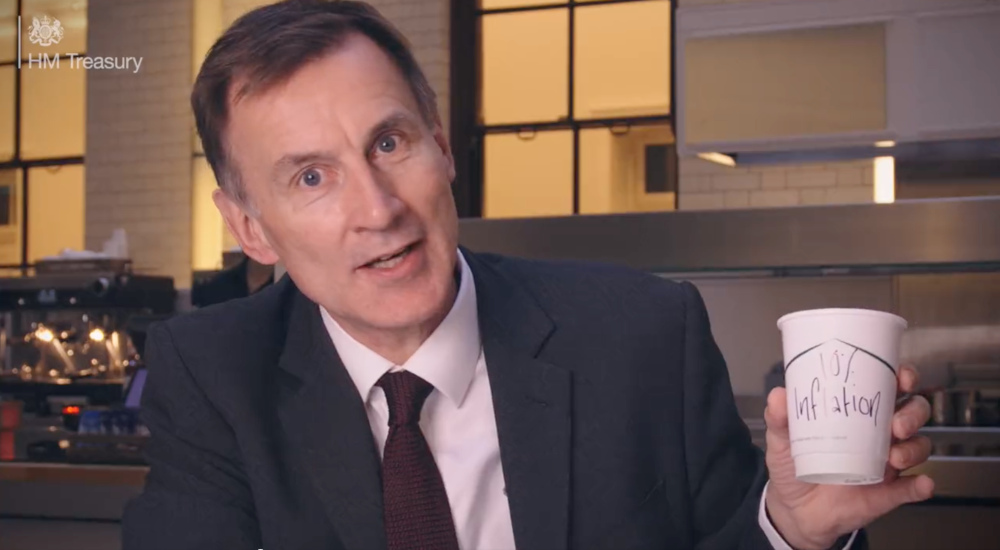When Rishi Sunak laid out his five pledges at the start of the year, his first and most prominent one was to halve inflation in 2023. A few weeks on: how’s that going?
This morning’s inflation figures would suggest not so well. Inflation fell in the 12 months leading up to December 2022 to 10.5 per cent, down from 10.7 per cent in November. So prices are moving in the right direction, but at a snail’s pace. Ross Clark has the details here, where he highlights how the rising cost of food and domestic services is cancelling out falling energy prices. Inflation is still projected to fall significantly by the time we reach summer, but as last month’s figures show, the process of getting there will not be an easy one.
You could try and defend the government by saying that today’s update predates Sunak’s pledge to cut inflation. The far more honest analysis, however, would be to acknowledge that the government had no control over last month’s inflation figures, in the same way that it will have no control over inflation updates in the coming months. Inflation is a monetary phenomenon, largely driven by increases to the money supply (i.e. the vast money printing that took place worldwide to deal with the Covid crisis). And the tools which can best control it – interest rate hikes – are controlled by the Bank of England.
Rishi Sunak knows this. He has one of the best reputations amongst politicians for not only understanding the risks of inflation but predicting it. He was preparing the government’s finances for a possible inflation spike as early as spring 2021, as he knew full well that the Treasury would be helpless to control it once the cat was out of the bag.
This is what makes the video released by HM Treasury this morning particularly strange. In the video Chancellor Jeremy Hunt explains inflation and the government’s plan to halve it. Much is being made of Hunt’s delivery and his use of disposable coffee cups to illustrate his point. Personally, I think Hunt’s explanation of inflation is fine enough. In fact, it’s refreshing that Covid and lockdowns make his list of reasons for soaring prices – a point that has often gone overlooked, as ministers tend to find it easier to put all the blame on external factors, like Russia’s war against Ukraine.
Why is inflation high and how are we going to halve it?
— HM Treasury (@hmtreasury) January 18, 2023
Grab a coffee and let Chancellor @Jeremy_Hunt explain. pic.twitter.com/8mpf4xfxCO
The problem comes towards the end of the video, when he attempts to explain what the government will do about double-digit inflation. The two main examples include investing in ‘renewable and nuclear power’ so ‘energy prices aren’t at the whim of international gas markets’, and ‘balancing the nation’s books’ so international investors don’t ‘punish the UK with higher interest rates.’
The first point is misleading; the second makes very little sense. Renewable projects can take a decade or more to come online. Energy security has merits in its own right and could possibly help avoid an energy price spike in future – but that future is more like April 2033, than April 2023.
Even more importantly: just as there is a long list of reasons as to why Hunt was right to reign in Liz Truss’s borrowing spree, there are plenty of reasons not to want to see interest rates soar (right after Liz Truss’s mini-Budget, markets were projecting that interest rates would peak above 6 per cent – a level far too financially painful for the public to handle).
But claiming that the government is helping to tackle inflation by keeping interest rates down is simply wrong. Raising interest rates help curb inflation: one of the biggest criticisms of the Bank of England is that it has been too slow over the past year to do so. The bank rate is currently 3.5 per cent and is expected to rise by at least another half point, if not more, in a bid to get inflation under control.
It’s one thing to say this government wanted to avoid the terrible pain that was projected to come with such high interest rates under Truss. And the Chancellor is right that for homeowners specifically, mortgage costs are being kept down by lower rates. But it’s quite another to suggest that lower interest rates are the answer to lowering inflation, as this new video suggests. Indeed, it’s quite the opposite.
So why is the government pushing this misleading idea, that it can control inflation? Presumably Sunak and Hunt are confident that the forecasts for inflation this year are correct, which show it halving all on its own, and are hoping to claim political victory for a trend that’s already underway.
But it’s a risky game. Suggesting the government has any meaningful control over the headline inflation rate is only going to lead to questions about why it’s not coming down faster. As Hunt said this morning about the latest CPI update, ‘high inflation is a nightmare for family budgets, destroys business investment and leads to strike action.’ If this were only a matter of political will, you can bet inflation would have been halved long before now.
The government is already responsible for so many policy areas under strain. Why it’s going to the effort to be seen as responsible for things not in its control remains a mystery.







Comments